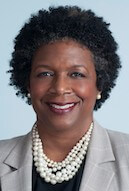Staff Profile: Sherri-Ann M. Burnett-Bowie, MD, MPH, Associate Director
 As Associate Director of CDI, Dr. Sherri-Ann M. Burnett-Bowie is particularly focused on advancing diversity, equity, and inclusion in the Mass General Department of Medicine and Harvard Medical School (HMS). Dr. Burnett-Bowie is driven by the synergistic missions of maximizing health, knowledge, and potential, and embedding diversity and inclusion into the fabric of academia. In addition to her role within CDI, Dr. Burnett-Bowie is the Chair of the Department of Medicine’s Diversity and Inclusion Board. Dr. Burnett-Bowie is an Assistant Professor in Medicine and an adult endocrinologist in the Mass General Endocrine Division.
As Associate Director of CDI, Dr. Sherri-Ann M. Burnett-Bowie is particularly focused on advancing diversity, equity, and inclusion in the Mass General Department of Medicine and Harvard Medical School (HMS). Dr. Burnett-Bowie is driven by the synergistic missions of maximizing health, knowledge, and potential, and embedding diversity and inclusion into the fabric of academia. In addition to her role within CDI, Dr. Burnett-Bowie is the Chair of the Department of Medicine’s Diversity and Inclusion Board. Dr. Burnett-Bowie is an Assistant Professor in Medicine and an adult endocrinologist in the Mass General Endocrine Division.
Dr. Burnett-Bowie received her Bachelor of Arts cum laude and Masters of Public Health from Harvard University; graduated AOA from the University of Pittsburgh School of Medicine; and completed her internal medicine residency and endocrine fellowship at MGH. Dr. Burnett-Bowie has received multiple awards to support her clinical investigation in mineral physiology and osteoporosis and to acknowledge excellence in teaching, the promotion of diversity and inclusion, and mentoring. Of note, Dr. Burnett-Bowie is a recipient of the CDI Physician-Scientist Development Award (2005), the HMS Harold Amos Faculty Diversity Award (2012), and the HMS A.Clifford Barger Excellence in Mentoring Award (2018).
Her personal statement about her work with CDI follows:
Sherri-Ann M. Burnett-Bowie, MD, MPHWe now see and promote our culture of inclusion as a value for all employees, not just our URM staff. My work with CDI is central to my real professional legacy.
Associate Director, CDI
I am a first-generation U.S. citizen. I went to Harvard for undergrad and to the University of Pittsburgh School for medical training. I wanted to be in Boston or New York City for my residency, and when I visited Mass General, I just knew that it was the place for me. I had this gut reaction–a feeling of connection to the people here–that started when I walked through the doors. I have stayed because of the authenticity; the staff’s love and care for patients and genuine support for each other.
I find Mass General to be an institution that believes, at its core, in the importance of providing excellent and equitable care, whether it’s to the patients who come through our doors or patients who are touched by our global health initiatives or research. The hospital’s history reflects a long-standing and deep commitment to social justice. For example, Mass General was the first hospital in the country to launch a hospital-based social work program (in 1905). Even then, Mass General was a leader in understanding that a patient’s social, cultural and economic circumstances are inextricably involved in his or her outcome.
I think people would be surprised at how nurturing this environment is. There are amazing people here, who are notable leaders in their fields, and yet they are surprisingly humble and real. They have dedicated their lives to education, to mentoring, to caring for patients. If you are invested in doing those things yourself, you will belong.
Before I came to Mass General, I assumed that I wouldn’t find many residents of color here, but I was wrong. If I could say anything to underrepresented in medicine (URM) students or faculty who are considering their options, it would be, “You are doing yourself a disservice if you don’t take a look at Mass General.”
Boston is a very special city. It has been a wonderful place for me and a great place to start my family.
In addition to my work as a physician and researcher, since 2010 I have been part of the staff of the Mass General Center for Diversity and Inclusion (CDI). This involvement came out of my desire to give back and show gratitude for the mentoring I myself received during my residency and after. The experience has been so much more rewarding than I could have imagined. Mentoring is both renewing and energizing. You are participating in the evolution of someone who will undoubtedly do amazing things.
CDI is experiencing a real renaissance. Our ability to articulate a substantive case for the value of diversity has evolved and our efforts have gained traction. Mass General President Peter L. Slavin, MD, has tasked each clinical department with developing its own diversity action plan. Accountability is evident, as chiefs are chairing or serving on these committees and financially supporting faculty to lead this work. Our programs for funding scholarship, mentorship and cross-cultural competency training continue to expand, and so has our thinking. We now see and promote our culture of inclusion as a value for all employees, not just our URM staff. My work with CDI is central to my real professional legacy.
Video interview with Dr. Burnett-Bowie
Work for One of the Nation's Top Hospitals
Discover what makes Mass General not just one of the best places to receive care, but also one of the best places to work.
